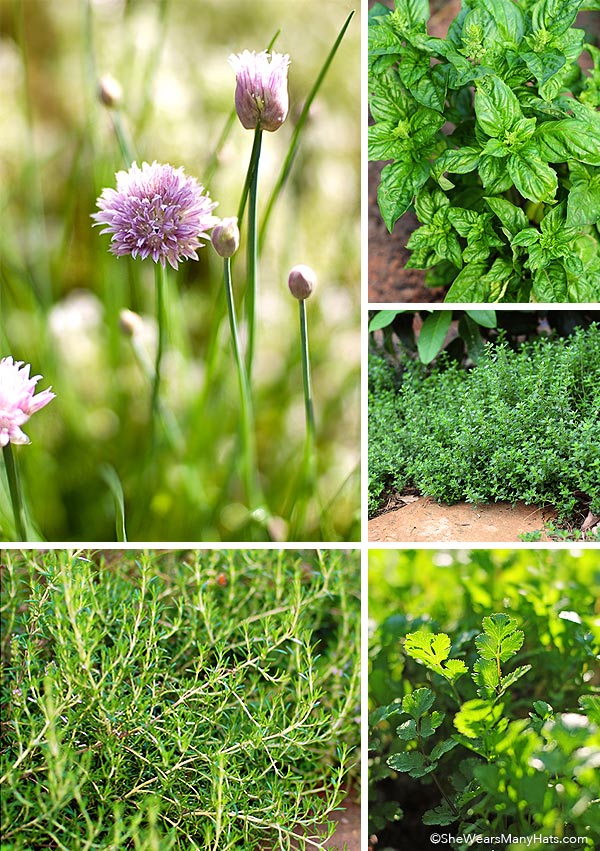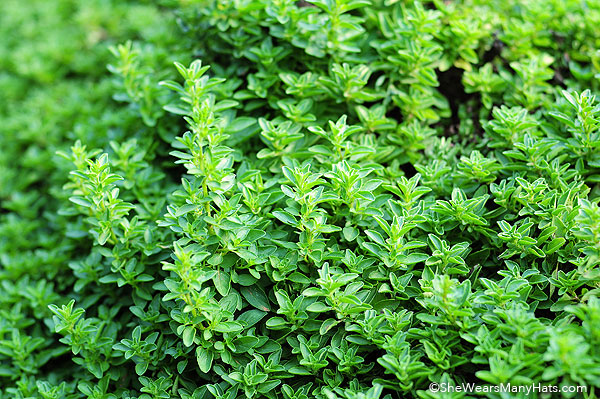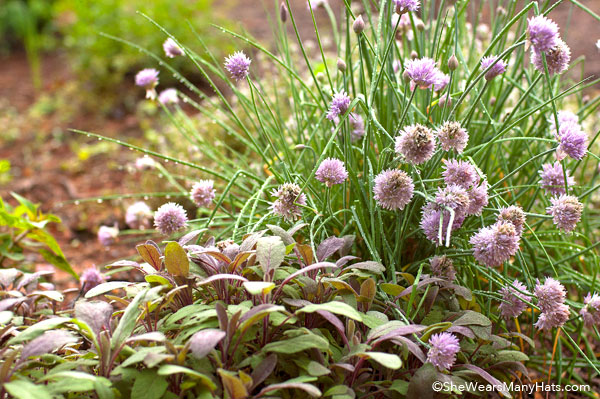Tips for Growing a Culinary Herb Garden
This post may contain Amazon or other affiliate links. As an Amazon Associate I earn from qualifying purchases.
Handy dandy tips for growing a culinary herb garden as well as a list of herbs to begin with if you’re new to gardening.
Having fresh herbs on hand for cooking is such a treat. Fresh herbs can transform an otherwise boring dish into something full of flavor and color. An herb garden can be budget friendly too. And that’s always a good thing.
If you’ve never grown your own herbs, it’s easier than you think. There are a variety of herbs that are easy to grow and many that are well-suited for growing in small containers. Whether you live on a large estate or in a cozy condo, if you have a sunny spot, there are herbs you can grow.
Basic tips for beginning an herb garden:
- Drainage. Most herbs prefer moist, but well-drained soil with plenty of sun. Very wet soils will not produce happy herbs.
- Not too much. Go easy on the fertilizer when growing herbs. If too much fertilizer is used, plants will produce large amounts of foliage with low quality flavor.
- In plain sight. Choose a sunny spot for your new herbs that will not be out of site, and therefore out of mind. If you can keep an eye on them, you can keep them happy, plus you will be more apt to use them.
- Keep it manageable. If you’re new to gardening, or space is limited, consider choosing two or three herbs to begin with. Begin with those you think you will use more.
- Read up. Each plant has different requirements for sun and soil. Be sure to do your homework, especially if you’re planning on different varieties sharing pots. Learn what specific needs are for each plant and if they will grow well in your climate. Also knowing which herbs are annual, biennials, and perennial will help you decide about how to arrange your plantings.
- This other post on Planning a Garden includes many helpful links and information.
A few herbs I recommend beginning with:
- Basil: Basil is one of my all-time favorites to grown, and to eat. When it’s in season it’s hard to not want to add it to every single dish. With so many varieties of basil, the creative culinary uses are almost endless.
- Cilantro (coriander): If you enjoy cilantro, you know that a fish taco, homemade guacamole or salsa made with fresh cilantro is hard to beat. If you’ve never grown your own, give it a go. Please note, cilantro does not like the heat. I’ve yet to find a way to grow it outside during the summer months in our area. We use it up during the spring and fall as it grows quickly during that time for us. We allow ours to bolt and go to seed in the spring to reseed for the fall and again in the fall for a spring harvest. As well as taking time to harvest some seeds to grind fresh coriander. The leaves of the cilantro/coriander plant are known as cilantro. The seeds are coriander. You get two for one with this plant!
- Rosemary: A hardy plant that makes for a wonderful addition to landscaping. Rosemary is a perennial and in most zones will act as an evergreen. We have a prostrate version planted in a several spots in our landscaping. It grows like crazy. I use it not only for cooking, but for cutting to use in live arrangements throughout the year.
- Thyme: I have to admit, I don’t use thyme as often as I should, but when I do, fresh thyme makes all the difference. As with so many herbs, thyme can be used as a fantastic addition to your landscaping — not just restricted to your herb garden area.
- Chives: A simple sprinkling of chives gives a baked potato, or creamy soup take on another personality all together. And that perky green is flavor for the eyes.
- Oregano: Fresh oregano for sauces and soups is a must. We’ve found it easy to grow. One variety we have had success with is Greek oregano. It’s like a patch of green carpet. So fragrant too!
- Sage: Leathery leaves of the sage plant are so attractive and can add great flavor to many savory dishes. Such a pretty plant, and I have found very hardy, returning each year. There are variety of sage plants to choose from.
- Mint: Mint is a great herb for use in many desserts and beverages, but Mint is extremely vigorous and tends to be quite invasive (as well as Lemon Balm and other plants from the mint family). I recommend to grow it in a container to avoid problems. Unless you have a bare spot of ground that you want covered. Even if Mint is grown in a container, the bottom of the container should be lined with landscape mesh or the like to prevent the roots from growing out the bottom and finding their way into the soil, because they will.
I hope this helps encourage you to start planning a culinary herb garden so you can add a bit of fresh flavor to your plate this year. What are your favorite herbs to cook with? Are there herbs you already grow?
Happy growing, AND happy cooking!
Originally posted March 12, 2013. Updated April 22, 2015.






Coriander, is most definitely my favourite herb. I should say that we use a lot of cilantro and coriander in our cooking, mainly for curries and other Asian dishes.
I find the best way to grow herbs, if you want them among your other plants, is to segregate them. You don’t want the roots of other plants to creep up and interfere with your precious herbs. Use bricks, stones or rocks on the the surface and before you put down and soil for the herbs, use massive rubbish bags to coat the area.
The best way to enjoy the cilantro leaves are to wash them (stay safe, you don’t want any sand or unexpected creatures in your meal) and then garnish on top of a noodle dish or an Asian soup.
The coriander seeds are great in Dahl (lentils) and other curries.
Great post and lovely pictures. My chives and oregano both come back each year and the patch is rather large. I love the purple flowers on the chives, so pretty. I grow basil, parsley, thyme, & dill as well. Leave extra room in your planters if growing basil as they can get rather large. I keep that one alone in its own planter for that reason. I grow my tomatoes and peppers also in large posts and they are delicious and I have tons of pasta sauce frozen each summer!
I tend to stick with basil and mint as they seem the easiest to maintain – plus work in almost anything! Sounds like people are having good success with coriander, so I think I’ll give that a go as well. Thanks. 🙂
After reading this post, making a herb garden is now my number one priority for the weekend. I love using herbs but they can be so expensive to buy and often aren’t the greatest quality. This is the perfect solution! Those basic tips were so handy and I can’t wait to have lovely vibrant herbs just like the ones in your photos.
Love this post! Thanks for all the great info!
Great tips Amy. You’re so right: re mint; I’ve put mine in a container on its own because it just takes over any container and chokes out other herbs! As far as thyme goes I love growing lemon thyme: the flavour is a little more delicate and it’s much easier to use it you can pick fresh tips (so you don’t have to spend time separating little leaves from woody stems).
Oh, I agree, Jason. Lemon thyme is so lovely!
I’ll get Kevin to read this as he has bought herbs we like and planning to grow an herb garden this summer!
Definitely, Rosemary! You should have a whole patch dedicated to your namesake. 😉
Thanks Amy for the timely reminder. Growing your own herbs can and is very rewarding.
Great pictures
have a good day
I know practically nothing about growing herbs (or anything else for that matter), so this was very helpful. Thanks so much for sharing!
Great post! I’m definitely showing your post to my sister, because she wants to make a herb garden for a long time already and your post might give her inspiration to start. Thank you for sharing all this nice and helpful information!
Wow, I had no idea that rosemary can be evergreen in some areas. My sister has been thinking about getting an herb garden for her backyard so she can cook with fresh spices. I will be sure to send this article to her so she can know how to best grow the general ones.
Hey dear, Thanks a lot for sharing such great stuff on gardening tips. I have got some fantastic tips and ideas in your post. You have just noted an essential point, “Not too much. Go easy on the fertilizer when growing herbs. If too much fertilizer is used, plants will produce large amounts of foliage with low quality flavor.” Most of the gardener does not know how to mulch the garden properly. I do hope this post will be more useful for the new and old gardener.
thank you shewearsmanyhats for giving me wonderful information